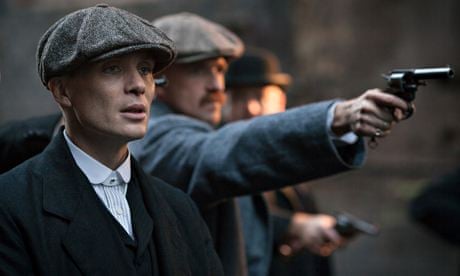If Peaky Blinders, the BBC's gangland drama from last year, is to be believed, then the residents of Birmingham in 1919 carried out their various illegal activities while looking impossibly stylish and listening to the songs of Nick Cave.
Nobody is pretending that this glossy and dapper series, which features such mighty names as Cillian Murphy and Sam Neill, gives the most accurate portrayal of postwar Midlands ever – the accents alone wouldn't stand up to much scrutiny. But what the show does provide is a thoroughly entertaining romp through a world of violence, robbery rackets, betting scams, family loyalties and murder.
Murphy plays Tommy Shelby, the gang's charismatic leader. He rides into the Small Heath area of Birmingham on horseback, a war veteran now hellbent on getting his gang back into profit. Shelby's entrance sends the local children scampering, clearly sensing the danger sitting on the saddle. What they don't know, but what viewers soon learn, is that the feared man is addicted to morphine – anything to dull his horrifying flashbacks to the trenches. Despite this weakness, Shelby looks astonishingly cool, his suits as sharp as the razorblade sewn into the peak of his cap, from which the show takes its name.
No gangster worth his salt comes without a nemesis though, and Shelby's is Belfast policeman Chester Campbell. Played by Sam Neill, Campbell is initially called across the water to investigate the theft of some guns by the IRA, but stays in a bid to clear the city of gangs. The IRA remain a presence throughout the series, their rivalry with the Peaky Blinders creating many a grisly face-off as the main story develops.
Central to the action is Grace Burgess, the beautful Irish barmaid at the drinking den the Peaky Blinders use as HQ. She is in the pay of the police, helping them to bring down Shelby, but instead the two become romantically involved. As loyalties swing back and forth, the tension between Campbell, Shelby and Burgess becomes almost unbearable as the action builds inexorably towards the big shootout in the riveting series finale.
Dubbed the British Boardwalk Empire when it first aired, the show has been given the big screen treatment, with stunning costumes and cinematography throughout. Each shot is filmed like a scene from a western, which is not the sort of treatment the city that gave us Black Sabbath and Crossroads is used to. And the use of modern music is inspired: Nick Cave's coolly menacing Red Right Hand is perfect as the theme tune, while Jack White surfaces in many guises, pushing the plot forward with The White Stripes track I Think I Smell A Rat, and ending the series with a solo cover of U2's Love Is Blindness.
It comes as no great surprise to learn that director Otto Bathurst cites Blade Runner and Sergio Leone as influences. Although it doesn't always succeed, Peaky Blinders is laudable for its ambition alone, all too rare in primetime drama. The pace, too, is breathtaking. While this occasionally leads to some clunky exposition, the powerful performances excuse everything.

Comments (…)
Sign in or create your Guardian account to join the discussion